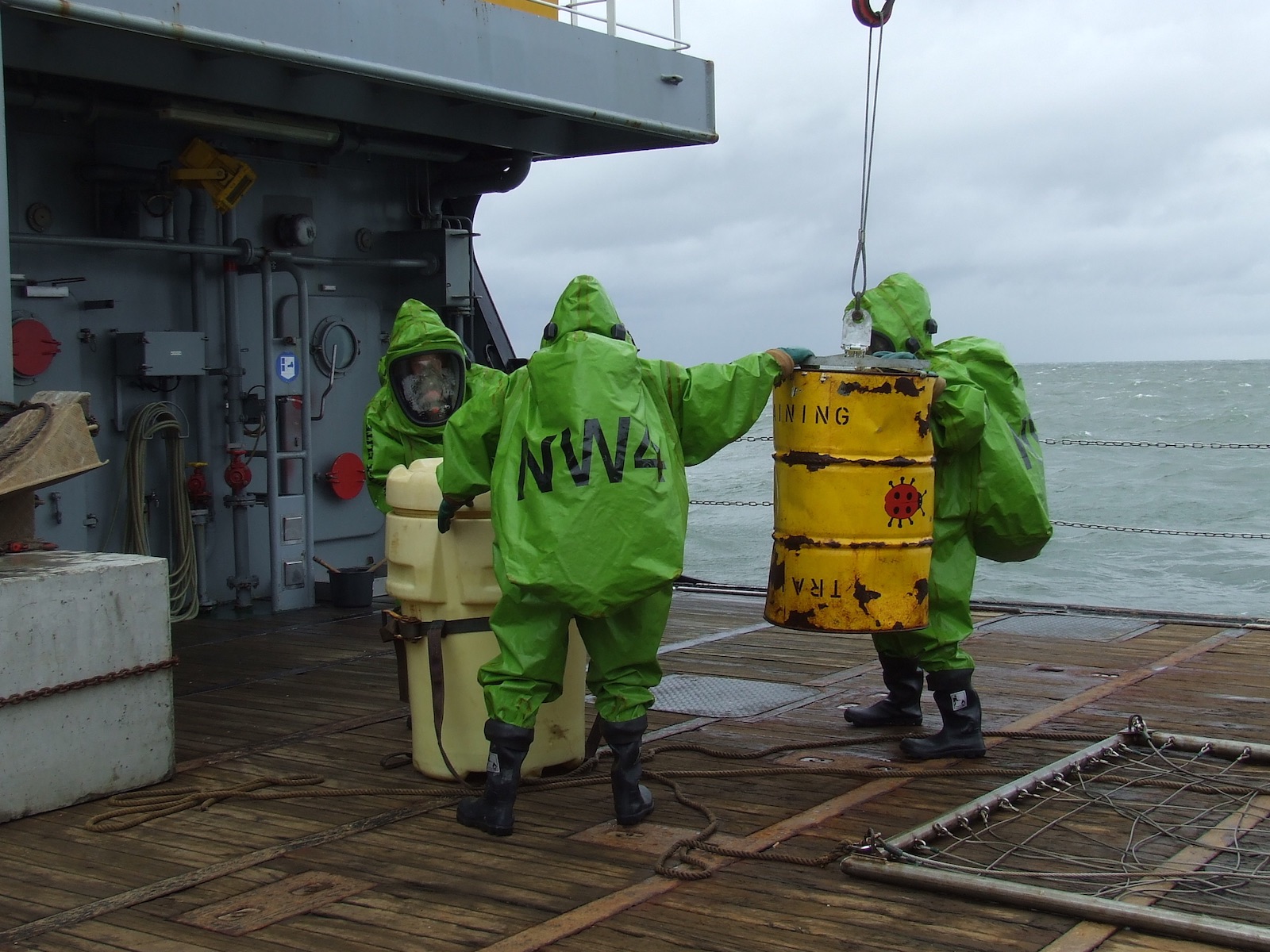Marine pollution
EU courses in the field of marine pollution
Period: May 2002 – July 2007
Background
The protection of the marine environment and the reduction of its pollution have been recognised as one of the most vital tasks to save our basis of life. It represents a difficult task due to reliance of modern societies on various types of utilisation and exploitation of the sea. A major source of marine pollution is resulting from ship operation, either accidents causing massive oil spills, or routine operations accompanied by spills of ballast water, water from tank washing and engine room effluent discharges. These threats to the environment, the sea and the coastlines require adequate response not only by national authorities. Due to the complex nature of the sea and the causes for pollution, marine pollution needs to be dealt at an international level.
The Institut für Energie und Kreislaufwirtschaft together with its partners contributes to this comprehensive task by organisation and implementation of workshops and training courses under the Community framework for cooperation in the field of accidental or deliberate marine pollution since 2002. From the start of the programme the institute welcomed participants of 17 maritime member states, Norway and Iceland.

The superior aims of the workshops/courses are to promote the exchange of knowledge, experience and opinions among professionals, institutions, legislative staff and dedicated organisations, to contribute to the build-up and extension of European expert networks in this field in order to shorten communication times and paths in emergency situations and to promote implementation of necessary improvements, to promote the increase of the managerial and organisational capacities of the European institutions involved in marine pollution response and to exchange and discuss countries approach, problems and needs and to develop possible solutions/good practices.
Courses
Response to chemical pollution (07/2007)
Training course from 5th to 7th July 2007 in Bremen, Germany
Objectives of the training course
The training course aims at giving an overview on the methodology to respond to chemical pollution by hazardous and Noxious Substances (HNS) at sea and on the sea bed. In comparison to the body of knowledge on oil pollution combating, there is only limited amount of knowledge on the various dangerous chemicals transported by sea and especially how to react in case of an emergency.
The main objectives of the course are:
- To familiarise the participants with methods of intervention which allow the minimisation of effects of chemical pollution and methods to recover or neutralise chemical substances
- To built up knowledge on how to minimise short-, medium-, and long-term environmental damages associated with accidental release of chemicals to marine systems on the sea surface and the sea bed
- To promote the exchange of knowledge, experience and opinions among professionals working for local, regional or national institutions and organisations
- To increase the capability of the institutions mentioned above to manage maritime emergencies involving HNS, by training management and organisational skills
To contribute to the formation of an European expert network in this field in order to shorten communication times and paths in emergency situations and to promote the implementation of necessary improvements.
Target audience:
The training course is designed for personnel responsible for and trained in combating oil pollution that have only limited experience in the field of chemical pollution. The background of participants can be administrative, nautical, technical or scientific. Attendees should be working in the vicinity of or be responsible for high-risk areas like ports of transshipment for chemical goods. Participants are envisaged, that actively contribute their experience and expertise in the discussions following the lectures as well as during the simulation exercise. The desktop simulation exercise in which the participants will work together in four working groups to develop an emergency response to a given scenario will provide the opportunity to apply the new knowledge.
Preliminary Agenda
The training course will be divided into three thematic sessions:
- Thematic session 1: Effects of chemicals on the sea and the sea floor
- Thematic session 2: Detection of chemicals and assessment of environmental damage
- Thematic session 3: Combating chemical spills
Minimisation of environmental damage in case of marine pollution (10/2006)
Workshop from 11th to 14th October 2006 in Bremen, Germany
Minimisation of environmental damage in case of oil pollution (09/2005)
Workshop from 22th to 24th September 2005 in Bremen, Germany
Response to oil pollution (07/2003)
Training course
Treatment of pollution waste (12/2002)
Training course
Bioremediation of wastes from marine pollution (11/2002)
Training course from 3rd to 7th November 2002 in Bremen, Germany
International liability and compensation regimes (05/2002)
Training course
Partners

Institut für Energie und Kreislaufwirtschaft an der Hochschule Bremen GmbH – project coordinator
Dr. Martin Wittmaier
Tel.: +49 (0) 421 5905-2311
Fax: +49 (0) 421 5905-2380
E-mail: wittmaier@hs-bremen.de
BLG CONSULT GmbH
www.blg-consult.de
Karsten Brünings
Tel.: +49 (0) 421 398 3442
Fax: +49 (0) 421 398 3437
E-mail: office@blg-consult.de

Environment & Marine Project Management Agency
Dr. Johanna B. Wesnigk
Tel./Fax: +49 (0) 421 50 79 20
Mobil: +49 (0) 170 755 78 26
E-mail: info@empa-bremen.de

University of Wales, Cardiff, UK
Dr. CF Wooldridge
School of Earth, Ocean and Planetary
Tel.: +44 (0) 2920 874 830
Fax: +44 (0) 2920 874 326
E-mail: wooldridge@cardiff.ac.uk
Target groups
The courses and their outcomes address a wide range of experts from maritime European member states, Norway and Iceland who are involved in the field of marine pollution, combating strategies and contingency planning.
The participants hold positions as decision-makers or/and work in the middle management. They have administrative, nautical, technical or scientific backgrounds.
Funding
The courses are co-funded by the European Commission within the framework of Community cooperation against accidental or deliberate marine pollution.

Institut für Energie und Kreislaufwirtschaft an der Hochschule Bremen GmbH
Institute for Energy, Recycling and Environmental Protection at Bremen University of Applied Sciences
-
Neustadtswall 30
28199 Bremen
Germany - +49 421 5905-2326
- office-iekrw@hs-bremen.de






